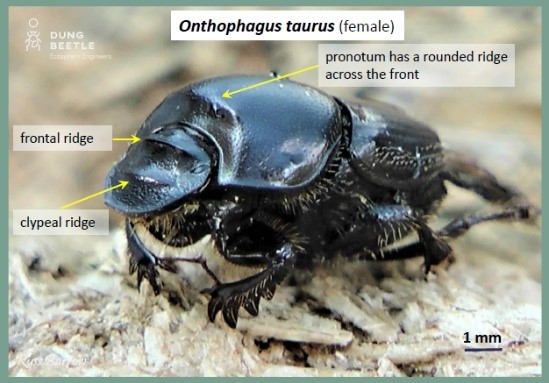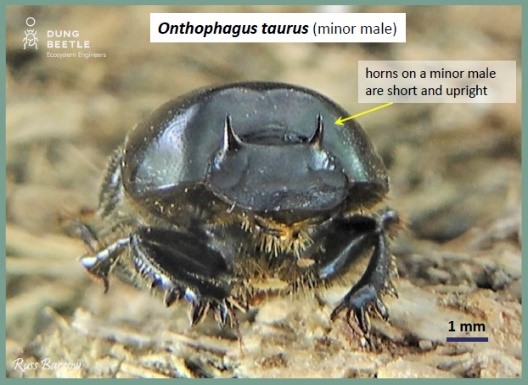Onthophagus taurus (introduced)


Size
8–10 mm
Colour
Shiny black
Horns
Major males have long, curved horns; females have none
Minor males
Very short horns extending upwards from back of head
Flight time
Day
Active seasons
Spring to autumn
Distribution in Australia
Victoria, WA, SA, Tas, NSW
South West Prime Lamb Group (SWPLG) demonstrations
O. taurus has been the most commonly found introduced dung beetle in SWPLG traps, occurring in large numbers at all host properties. Throughout summer, some sites caught enough beetles overnight to fill a 2.5L container. They’re a small beetle, but in large numbers they’re capable of shredding a dung pat within a day, making them valuable for cleaning pastures and controlling bush flies, particularly over summer/autumn. O. taurus will bury (rather than shred) at other times of the season.
Lifecycle
Development from egg to adult takes 8–10 weeks depending on soil temperature, and there are at least two generations a year. The adults build nesting areas with several brood balls, approximately 10–15 cm below the dung pat. Each brood ball has one egg.
Interesting facts
O. taurus can pull 1140 times its own body weight – the equivalent of a 70-kilogram person being able to lift 80 tonnes, the weight of six double-decker buses (ABC Science).
Minor males apparently compensate for their much smaller horns by having huge testicles, increasing their chances of fertilising a female (ABC Science).
Dung burial
O. taurus buries dung to around 10–15 cm. These beetles are not too discerning about the species providing a dung source. You may find even them shredding dog dung.
Preferences and establishment
The number of beetles present on a farm is largely dependent on the amount of dung available. Beetles can be introduced as starter colonies or from farms with an ample population. A list of dung beetle suppliers can be found on the Dung Beetle Ecosystems Engineers link below, many of which can provide O. taurus.